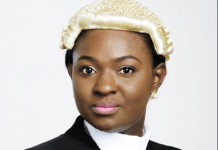U.S. President Joe Biden on Friday blamed Russian President Vladimir Putin for Alexei Navalny‘s death and warned there could be consequences, saying he was “not surprised” but “outraged” by the opposition leader’s passing.
“We don’t know exactly what happened, but there is no doubt that the death of Nalvany was a consequence of something that Putin and his thugs did,” Biden said at the White House after Russian prison officials announced that Navalny had died.
“Russian authorities are going to tell their own story,” Biden said. “But make no mistake. Make no mistake: Putin is responsible for Navalny’s death.”
He also said he was “contemplating” additional steps to punish Russia in the aftermath of Navalny’s death, paying tribute to the opposition leader for “bravely” standing up to Putin’s government’s “corruption” and “violence.”
“We’re contemplating what else can be done,” Biden said in response to questions from reporters. “We’re looking at a whole number of options, that’s all I’ll say right now.”
Biden also told reporters that there was “no nuclear threat to the people of America or anywhere else in the world with what Russia is doing at the moment,” even as Russia considered deploying anti-satellite technology in space. Russia has previously denied the claim.
The White House did not immediately respond to a request for comment on what possible steps against Russia were being evaluated.
U.S. officials were still seeking more information about Navalny’s death at a Russian penal colony north of the Arctic Circle, where he was dispatched less than two months ago.
But the development, and Biden’s reaction, has put a further chill into already bitter U.S.-Russian relations.
The 47-year-old Navalny had been a leading critic of Putin, and Biden had said after meeting Putin in Geneva in June 2021 that Nalvany’s death would risk devastating consequences for Putin.
Biden and Putin remain deeply at odds over Russia’s invasion of Ukraine two years ago, over which Russia has been sanctioned by the United States and other Western nations, and Biden is urging Republican hardliners in the U.S. Congress to support additional funding to pay for more weaponry for Ukraine’s military.
Russia has figured prominently on the campaign trail as Biden seeks reelection in November.
His expected Republican opponent, former President Donald Trump, triggered bipartisan outrage last week by saying he would do nothing to defend NATO allies from Russia unless they paid a greater share for the common defenses.
The top Republican in Congress, House of Representatives Speaker Mike Johnson, has not put a Senate bill including $95.34 billion in security assistance for Ukraine and Israel, international humanitarian aid and resources to help allies in the Indo-Pacific up to a vote.
After Navalny’s death, Johnson said the U.S. and its allies should use “every means available to cut off Putin’s ability to fund his unprovoked war in Ukraine and aggression against the Baltic states.”
“History’s watching the House of Representatives. The failure to support Ukraine at this critical moment will never be forgotten,” Biden said.
In Munich for a major security conference, Vice President Kamala Harris vowed that the U.S. would never retreat from its NATO alliance obligations put in place after World War Two, contrasting Biden’s approach to global engagement with presidential election hopeful Trump’s isolationist views.
She also met with Alexei Navalny’s wife Yulia on the margins of the conference and “expressed her sorrow and outrage” over reports of her husband’s death, a White House official said.
Biden’s presidential reelection campaign on Friday released a new minute-long advertisement blasting Trump for abandoning NATO. They planned to target the ad to 2.5 million American voters in the closely contested election states of Michigan, Wisconsin, and Pennsylvania who trace their ancestry to the NATO states bordering Russia.
(Reporting by Steve Holland and Trevor Hunnicutt; Additional reporting by Ismail Shakil, Gabriel Araujo and Doina Chiacu; Editing by Chizu Nomiyama and Jonathan Oatis)
By Steve Holland and Trevor Hunnicutt
Editor’s note: Views expressed in this article do not represent that of The Chronicle









